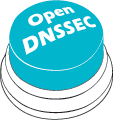Index
Introduction
The vulnerabilities in the DNS system was addressed at an IETF meeting in November 1993 where the first organized work started on the Domain Name System Security Extentions (DNSSEC). The resolver/user can, with the help of digital signatures, detect any modifications by third parties on the information from the DNS system, thus defeating most of the known vulnerabilities. DNSSEC is although vulnerable to the DoS attacks, like all other network services. For more information on how DNSSEC is working, read http://www.dnssec.net
A major obstacle to the widespread adoption of DNSSEC is the complexity of implementing it. There is no package that one can install on a system, click the "start" button, and have DNSSEC running. Instead, there are a variety of tools, none of which on their own is a complete solution. To actually run a DNSSEC-enabled authoritative server requires writing custom scripts to link them together. Even then, aspects of DNSSEC management such as key management and use of hardware assistance (such as HSM:s) have not been adequately addressed.
The purpose of the OpenDNSSEC project is to make the DNSSEC handling as automated as possible with as high performance as possible, thus reducing the effort for the system administrator. This project will produce software that will provide the comprehensive package mentioned in the problem discussion.
Wiki in state of rebuild
At the moment there is maintenance on the Wiki of OpenDNSSEC meaning that this site is today (12 Feb 2024) and possibly tomorrow only a placeholder and not having the full information available.


